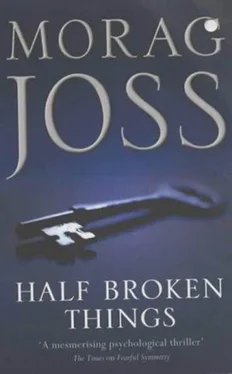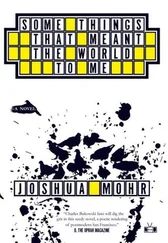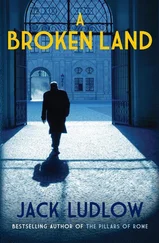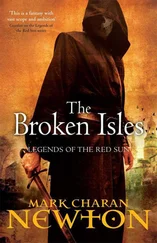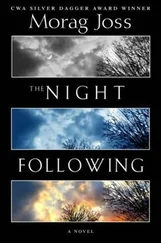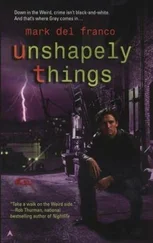Morag Joss - Half Broken Things
Здесь есть возможность читать онлайн «Morag Joss - Half Broken Things» весь текст электронной книги совершенно бесплатно (целиком полную версию без сокращений). В некоторых случаях можно слушать аудио, скачать через торрент в формате fb2 и присутствует краткое содержание. Жанр: Детектив, на английском языке. Описание произведения, (предисловие) а так же отзывы посетителей доступны на портале библиотеки ЛибКат.
- Название:Half Broken Things
- Автор:
- Жанр:
- Год:неизвестен
- ISBN:нет данных
- Рейтинг книги:3 / 5. Голосов: 1
-
Избранное:Добавить в избранное
- Отзывы:
-
Ваша оценка:
- 60
- 1
- 2
- 3
- 4
- 5
Half Broken Things: краткое содержание, описание и аннотация
Предлагаем к чтению аннотацию, описание, краткое содержание или предисловие (зависит от того, что написал сам автор книги «Half Broken Things»). Если вы не нашли необходимую информацию о книге — напишите в комментариях, мы постараемся отыскать её.
Loners Jean, Micheal and Steph are drawn together to Walden Manor by a mixture of deceit, good luck and misfortune. There, they shape new lives, full of hope and happiness. When their idyll is threatened they discover their new lives are worth preserving. But at what cost?
Half Broken Things — читать онлайн бесплатно полную книгу (весь текст) целиком
Ниже представлен текст книги, разбитый по страницам. Система сохранения места последней прочитанной страницы, позволяет с удобством читать онлайн бесплатно книгу «Half Broken Things», без необходимости каждый раз заново искать на чём Вы остановились. Поставьте закладку, и сможете в любой момент перейти на страницу, на которой закончили чтение.
Интервал:
Закладка:

Morag Joss
Half Broken Things
© 2003
For Iain Burnside
’But this is what… people are so often and so disastrously wrong in doing: they (who by their very nature are impatient) fling themselves at each other when love takes hold of them, they scatter themselves, just as they are, in all their messiness, disorder, bewilderment…
‘And what can happen then? What can life do with this heap of half broken things that they would like to call their happiness, and their future?
‘And so each of them loses himself for the sake of the other person, and loses the other. And loses the vast possibilities… in exchange for an unfruitful confusion, out of which nothing more can come; nothing but a bit of disgust, disappointment and poverty.’
From LETTERS TO A YOUNG POET by Rainer Maria Rilke, translated by Stephen Mitchell, copyright © 1984 Stephen Mitchell. Used by permission of Random House, Inc.
January
Walden Manor
August
This is not what it might look like. We’re quiet people. As a general rule extraordinary things do not happen to us, and we are not the type to go looking for them. But so much has happened since January, and I started it. Things began to happen, things I must have brought about somehow without quite foreseeing where they would lead. So I feel I must explain, late in the day though it is. I’m going to set out, as clearly as I can, in the order in which they occurred, the things that have happened here. And I shall find it difficult because I was brought up not to draw attention to myself and I’ve never been considered a forthcoming person, never being one to splurge out on anything, least of all great long explanations. Indeed, Mother always described me as secretive. But that was because, with her, I came to expect my reasons for things to be not so much misunderstood as overlooked or mislaid, and so early on I stopped giving them.
Father was usually quiet, too. When I think back to the sounds of the house in Oakfield Avenue where I grew up, I do not remember voices. I think we sighed or cleared our throats more often than we spoke words. I remember mainly the tick of Father’s longcase clock in the dining room we never ate in, and then after the clock had gone, a particular silence throughout the house that I thought of as a shade of grey. And much later when I was an adult, still there looking after Mother, the most regular sound was the microwave. It pinged a dozen times a day. In fact, until recently, whenever I heard a certain tone of ping, in a shop or somewhere like that, I would immediately smell boiling milk. But when I was a child there was just the clock, with silences in between.
Mother had few words herself. She often went about the house as if she were harbouring unsaid things at great personal cost, with a locked look on her mouth. That being so, I suppose Father and I felt unable to open our own mouths very much. What happens to all the things you might say or want to say, but don’t? Well, they don’t lie about in your head indefinitely, waiting to be let out. For a time they may stay there quite patiently, but then they shuffle off and fade until you can’t locate them any more, and you realise they’re not coming back. By then you’re past caring.
So I grew to think of myself as someone not in particular need of words. I did not acquire the habit of calling them up; not many at a time at least, not even to myself in my own head. Things in my head had been very quiet for a long time, before all this.
But I have been wrong about this aspect of myself, as about others. I find that there are words there after all. Now that I need them, my words have come crowding back, perhaps because I have a limited time in which to get them all down (today is the 20th, so only eleven more days). I am pleased that my hands remember the old touch-typing moves without seeming to involve me at all. The letters are hitting the paper in this old typewriter almost as if they were being shot out of my finger-ends. Which is just as well, because I’m busy enough dealing with all the clamouring words that are flinging themselves around in my head, fighting over which gets fired out first. I’m in a hurry to let them loose. I want to explain, because it is suddenly extremely urgent and important that, in the end, we are not misunderstood.
And I shall try to put down not just what, but why things have happened and why none of it could have turned out any differently. Until now I really haven’t thought about the why. Time’s the thing. I haven’t had time, not time of the right kind, to ask myself why things have gone the way they have. I’ve been too busy being happy; even now I’m happy, although the time left is of the other kind. But I’m quite content to spend it trying to puzzle it all out and write it down. It’s a pleasant way to pass time, sitting over the typewriter at the study window and looking out now and then to wave at them (that’s Michael, Steph and Charlie) down there in the garden. They’re not doing much. Steph is singing to Charlie and rocking him on her lap: ’Row, row, row the boat’- that’s one of Charlie’s favourites- and the more she rocks the more he likes it. They’re waving back now. I’ve told them I’ve got to write a report for the agency and in a way, that’s almost true, so they’re making pretend-sad faces up at me because I can’t spend the afternoon with them. And now Steph’s got hold of Charlie’s wrist and she’s making him wave too. Behind them, I can see three different kinds of Michaelmas daisy in the border, three nice shades of purple. But the roses are on their second flowering now and look as if the air’s gone out of them, as if they’ve stayed too long at the party.
Anyway, I’m going off the point. I was saying that I’m going to explain everything. And while I cannot imagine any explanation for anything that does not also contain an element of justification, I am not trying to offer excuses for what we have done. But nor am I apologising, quite, except for the mess and inconvenience, which are bound to be considerable.
So how did it start? With the letter from the agency? Or with the advertisement I placed? Perhaps much earlier, years and years ago, with Jenny. Jenny is the niece I invented for myself. Yes, perhaps that reveals a tendency. She started as just a little harmless face-saving white lie which of course led to others, and in no time at all the fact that she did not exist was neither here nor there. My niece became quite real to me, or as real as somebody living in Australia ever could be, in my mind. I haven’t travelled abroad.
No, now that I reflect, it started with this place, with the house itself. Because the house made me feel things from the very first which perhaps I should find strange, it being my fifty-eighth. Memories are a little blurred after fifty-seven in eighteen years, but I do know I’d never felt things before. This is the fifty-eighth house, although I’ve sat some houses more than once because people used to ask for me again. I specialise, or I did, in long stays. ‘We have the perfect lady, flexible, no ties, usually available’ was how I was recommended. I spell this out just so that it is clear that I have been well thought of. Inexperience has nothing to do with it. Nor was it anything to do with malice or jealousy.
The house when I came was full of old things; fuller than it is now, for reasons I will come to. Many of them were not in mint condition, and I liked them like that.
Читать дальшеИнтервал:
Закладка:
Похожие книги на «Half Broken Things»
Представляем Вашему вниманию похожие книги на «Half Broken Things» списком для выбора. Мы отобрали схожую по названию и смыслу литературу в надежде предоставить читателям больше вариантов отыскать новые, интересные, ещё непрочитанные произведения.
Обсуждение, отзывы о книге «Half Broken Things» и просто собственные мнения читателей. Оставьте ваши комментарии, напишите, что Вы думаете о произведении, его смысле или главных героях. Укажите что конкретно понравилось, а что нет, и почему Вы так считаете.
